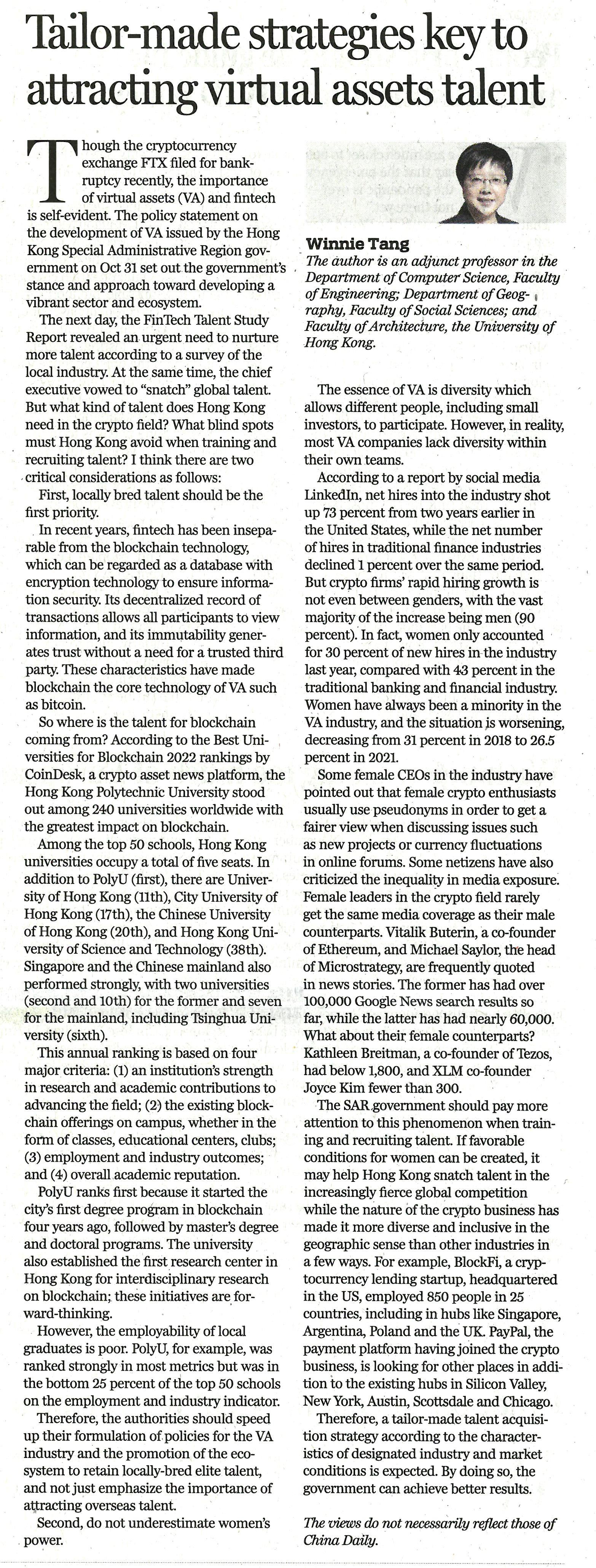網上版請按此

Tailor-made strategies key to attracting virtual assets talent
Though the cryptocurrency exchange FTX filed for bankruptcy recently, the importance of virtual assets (VA) and fintech is self-evident. The policy statement on the development of VA issued by the Hong Kong Special Administrative Region government on Oct 31 set out the government's stance and approach toward developing a vibrant sector and ecosystem.
The next day, the FinTech Talent Study Report revealed an urgent need to nurture more talent according to a survey of the local industry. At the same time, the chief executive vowed to "snatch" global talent. But what kind of talent does Hong Kong need in the crypto field? What blind spots must Hong Kong avoid when training and recruiting talent? I think there are two critical considerations as follows:
First, locally bred talent should be the first priority.
In recent years, fintech has been inseparable from the blockchain technology, which can be regarded as a database with encryption technology to ensure information security. Its decentralized record of transactions allows all participants to view information, and its immutability generates trust without a need for a trusted third party. These characteristics have made blockchain the core technology of VA such as bitcoin.
So where is the talent for blockchain coming from? According to the Best Universities for Blockchain 2022 rankings by CoinDesk, a crypto asset news platform, the Hong Kong Polytechnic University stood out among 240 universities worldwide with the greatest impact on blockchain.
Among the top 50 schools, Hong Kong universities occupy a total of five seats. In addition to PolyU (first), there are University of Hong Kong (11th), City University of Hong Kong (17th), the Chinese University of Hong Kong (20th), and Hong Kong University of Science and Technology (38th). Singapore and the Chinese mainland also performed strongly, with two universities (second and 10th) for the former and seven for the mainland, including Tsinghua University (sixth).
This annual ranking is based on four major criteria: (1) an institution's strength in research and academic contributions to advancing the field; (2) the existing blockchain offerings on campus, whether in the form of classes, educational centers, clubs; (3) employment and industry outcomes; and (4) overall academic reputation.
PolyU ranks first because it started the city's first degree program in blockchain four years ago, followed by master's degree and doctoral programs. The university also established the first research center in Hong Kong for interdisciplinary research on blockchain; these initiatives are forward-thinking.
However, the employability of local graduates is poor. PolyU, for example, was ranked strongly in most metrics but was in the bottom 25 percent of the top 50 schools on the employment and industry indicator.
Therefore, the authorities should speed up their formulation of policies for the VA industry and the promotion of the ecosystem to retain locally-bred elite talent, and not just emphasize the importance of attracting overseas talent.
Second, do not underestimate women's power.
The essence of VA is diversity which allows different people, including small investors, to participate. However, in reality, most VA companies lack diversity within their own teams.
According to a report by social media LinkedIn, net hires into the industry shot up 73 percent from two years earlier in the United States, while the net number of hires in traditional finance industries declined 1 percent over the same period. But crypto firms' rapid hiring growth is not even between genders, with the vast majority of the increase being men (90 percent). In fact, women only accounted for 30 percent of new hires in the industry last year, compared with 43 percent in the traditional banking and financial industry. Women have always been a minority in the VA industry, and the situation is worsening, decreasing from 31 percent in 2018 to 26.5 percent in 2021.
Some female CEOs in the industry have pointed out that female crypto enthusiasts usually use pseudonyms in order to get a fairer view when discussing issues such as new projects or currency fluctuations in online forums. Some netizens have also criticized the inequality in media exposure. Female leaders in the crypto field rarely get the same media coverage as their male counterparts. Vitalik Buterin, a co-founder of Ethereum, and Michael Saylor, the head of Microstrategy, are frequently quoted in news stories. The former has had over 100,000 Google News search results so far, while the latter has had nearly 60,000. What about their female counterparts? Kathleen Breitman, a co-founder of Tezos, had below 1,800, and XLM co-founder Joyce Kim fewer than 300.
The SAR government should pay more attention to this phenomenon when training and recruiting talent. If favorable conditions for women can be created, it may help Hong Kong snatch talent in the increasingly fierce global competition while the nature of the crypto business has made it more diverse and inclusive in the geographic sense than other industries in a few ways. For example, BlockFi, a cryptocurrency lending startup, headquartered in the US, employed 850 people in 25 countries, including in hubs like Singapore, Argentina, Poland and the UK. PayPal, the payment platform having joined the crypto business, is looking for other places in addition to the existing hubs in Silicon Valley, New York, Austin, Scottsdale and Chicago.
Therefore, a tailor-made talent acquisition strategy according to the characteristics of designated industry and market conditions is expected. By doing so, the government can achieve better results.
Dr. Winnie Tang
Adjunct Professor, Department of Computer Science, Faculty of Engineering; Department of Geography, Faculty of Social Sciences; and Faculty of Architecture, The University of Hong Kong